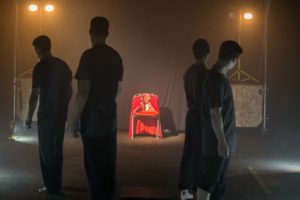You have no items in your cart. Want to get some nice things?
Go shoppingThe door is slammed shut. We are trapped in a dark, smoky room with four figures – theatre stewards who are playing prison guards – standing before us. The sound of heavy doors slamming heightens the mood. We have entered a dank, old-fashioned prison.
The guards tell us they have been given our names, and if our name is called we must line up on the other side of the room. I am genuinely nervous. Only five names are called and the rest of us sit in two rows on either side of the stage.
The five people selected are tonight’s actors, who soon change into grey shirts and black trousers and remove their shoes and socks. They’ll recite parts of Oscar Wilde’s The Ballad of Reading Gaol, written after Wilde had endured two year’s hard labour for his sexuality, which is interspersed with five original monologues telling the stories of various imagined prisoners sharing the jail with Wilde.
Oscar Wilde is inescapable this year. Last year, former Shakespeare’s Globe artistic director Dominic Dromgoole announced that his new company, Classic Spring, would perform Wilde’s plays throughout 2018 at the Vaudeville theatre in celebration of the famous writer.
Theatre company Tall Stories also created a musical performance based on Wilde’s fairy tales in December last year: Wilde Creatures. Rupert Everett’s film The Happy Prince is still in cinemas, which focuses on Wilde’s exile in France after he was released from prison.
Is there a particular reason for the renewed interest in Wilde? Dromgoole told The Stage that he hopes his season shines a new light on Wilde’s plays and Wilde himself. Everett’s film shows Wilde’s downfall, presenting the playwright as deeply flawed while still celebrating his wit.

Reading Gaol doesn’t focus much on Wilde himself, but it explores the place he was incarcerated for two years, inviting the audience into the dank world of a Victorian prison. The only props are a chair, red coat, flash lights, torches and chalk, and this minimalism is perfect for the prison setting.
At one point the actors run back and forth as they recite the poem, reflecting the physical labour that prisoners (including Wilde himself) were subjected to. The hanging man motif of Wilde’s poem is brought to life when an actor ‘hangs’ the red coat.
The monologues compliment the themes of Wilde’s poem, although they have little to do with his own prison experience. “Each man kills the thing he loves” is literally the case in the first monologue, aptly called Monster. It tells the story of a man who risked everything for the thing he loves the most – which in the case is money.
Monster (James Vincent) guides the audience through his life, from his first job in a chemist where he stole money from the till to the girl he planned to marry after reading about her parents’ fortune in the paper. Monster was horrified when his wife fell pregnant. He knew the baby would inherit his fortune, so he explains how he took care of the problem.
Monster is a straightforward villain whose story is predictable, but the script is amusing and has memorable quotes. “Some of you might think of me as a monster. I see myself as an entrepreneur,” Monster quips at one point. The characterisation is well done – Vincent has a nervous, slightly unhinged laugh. Monster talks to us directly, making prolonged eye contact, even ruffling one audience member’s hair.
The next monologue, Guardian, is more ambiguous. Set to the rhythm of a tapping, ticking clock, Guardian (Malcolm Jeffries) speaks quickly, as if he’s afraid the audience will leave if he doesn’t grab their attention. He has names, presumably of other prisoners, written on his stomach and he asks an audience member to write their name on his arm.
It’s hard to tell whether Guardian is another prisoner or representative of prison itself, a host for prisoners’ experiences. “I don’t get guests, only ghosts. My head is a fucking theatre,” he says. Some clarification would have been nice, but the fast-paced urgency of his performance is atmospheric. The monologue reveals a desperation in the prisoners’ monotonous boredom, where time is both limited and endless.

During Human, performed by Nic James, the actors recreate a battle in an African forest. Running around in pitch darkness wielding flashlights, the actors recreate the madness and confusion of war. This piece highlights how lives are wasted – the man who went to war to win his girlfriend’s approval, the young lad who wanted to show his father he was a ‘real’ man, the narrator who survives only to find life has gone on without him.
Innocent, performed by Miles Parker, is a simple but moving story. Addressed to the speaker’s childhood friend Lily, Innocent explains why he left his country home for the crowded streets of London with a friend who quickly becomes a violent drunk. This character has a simple, kind nature and cannot understand why his friend hits him, or why the police won’t believe his innocence. It’s a sad story which highlights the wide range of people who might have found themselves in a Victorian prison.
Hero, told by Nick Cope, is spoken directly to someone the audience cannot see, a loved one outside of the prison. The actor is covered with bruises – a black eye, a bandage and a wound on his side. He talks directly to his lover, musing about what freedom is. How he feels like he is drowning. How he cannot quite find the words to express himself.
The identity of this speaker is undisclosed, but it could easily be Wilde himself. The line, “This can’t be the end, there is something waiting at the end of this nightmare” is especially upsetting if we read the monologue in this way. The writer would never really recover from the nightmare that his trial created.
The theme of criminalised homosexuality should have been explored, but Reading Gaol is still a dark, gripping performance which explores the Victorian prison system in a unique, versatile fashion. It takes us away from the rich people behaving badly in drawing rooms who populate Wilde’s plays to a dark, grimy place where villains, innocents and those in-between are locked away.
Reading Gaol will play at Theatre N16 until 3 August.
About Sophia Moss
Sophia Moss is a theatre reviewer for The Upcoming and The Reviews Hub. Also freelances for Prospect magazine, Ethiad Atlas, Sticky Content and The Sun.




